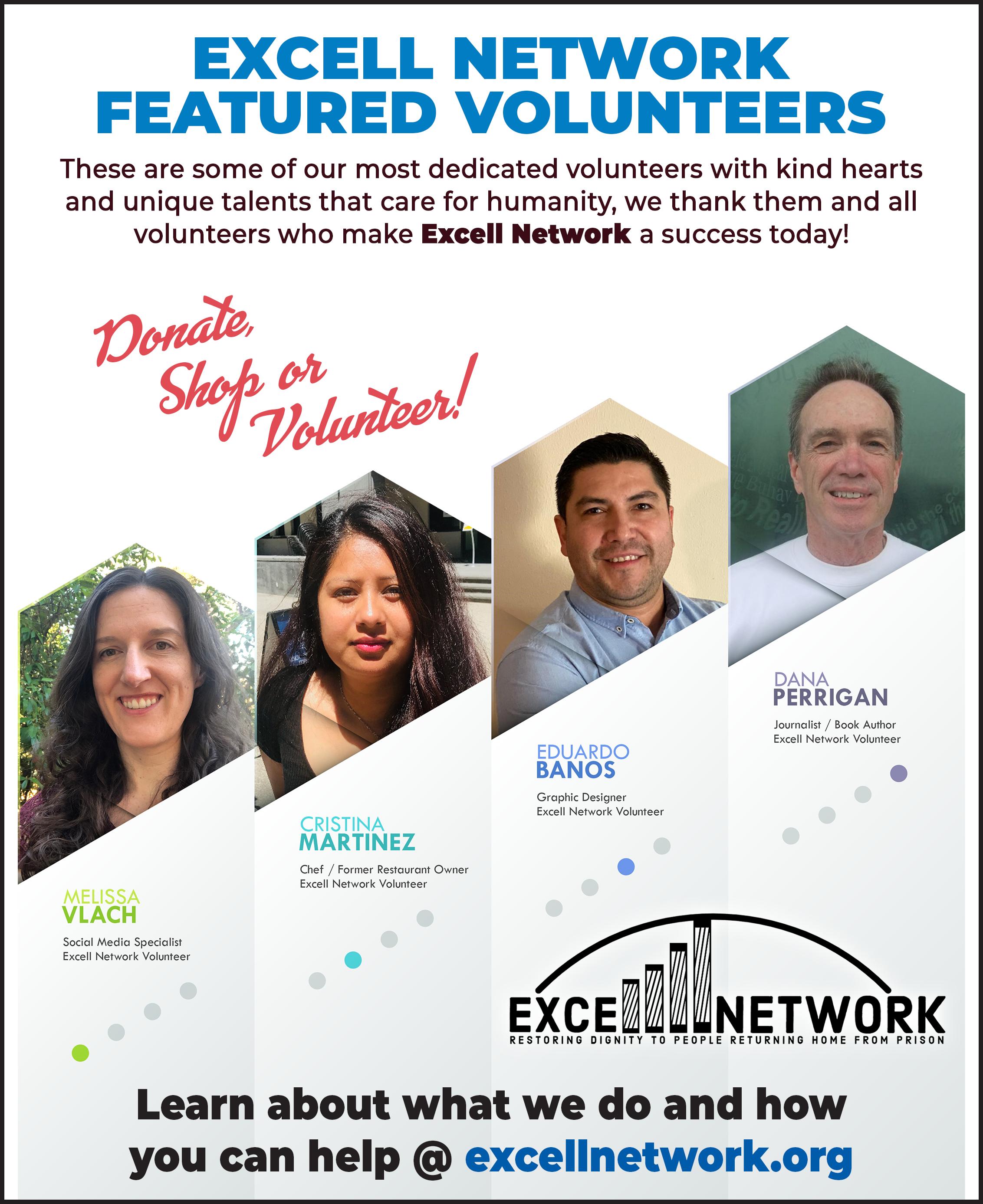

TOGETHER WE CAN DO GREAT THINGS
RESTORING DIGNITY TO PEOPLE RETURNING HOME FROM PRISON
WE BELIEVE THAT EVERYONE CAN EXCEL AT WHAT THEY DO



TOGETHER WE CAN DO GREAT THINGS
RESTORING DIGNITY TO PEOPLE RETURNING HOME FROM PRISON
WE BELIEVE THAT EVERYONE CAN EXCEL AT WHAT THEY DO
A holiday message from the founder of Excell Network
As I near my 25th year of service in restorative justice ministry, I do so with the firm conviction that my founding principles are as valid today as they were in 1995: vision, assessment, and LOVE in what I do with the help of God and for God. This year, in October 2020 we introduced Excell Network
In our mission at Excell Network, we believe that everyone can excel at what they do when they want a change. We restore dignity to people returning home from prison by providing scholarship stipends to empower students to achieve academic and career goals that they want to obtain. Our approach is the same that the loving Father had for his prodigal son who returned home: He restored his dignity.
We invite you to be part of our efforts by donating, shopping for a holiday gift in our online store, and/ or by volunteering. We invite you to learn more about us by visiting excellnetwork.org.
The holidays are a time to give thanks and to reflect on all we have accomplished together in the past year and to look forward to a new year of inspired purpose. Truly now is the most wonderful time of the year — a time for us also to gather in a safe way to celebrate and enjoy the sense of family and community that we share. We THANK our donors who believe in us.
On behalf of all of us at Excell Network, we send our best wishes to you and yours for a wonderful holiday season, and a blessed, prosperous, peaceful and healthy new year.
JULIO ESCOBAR

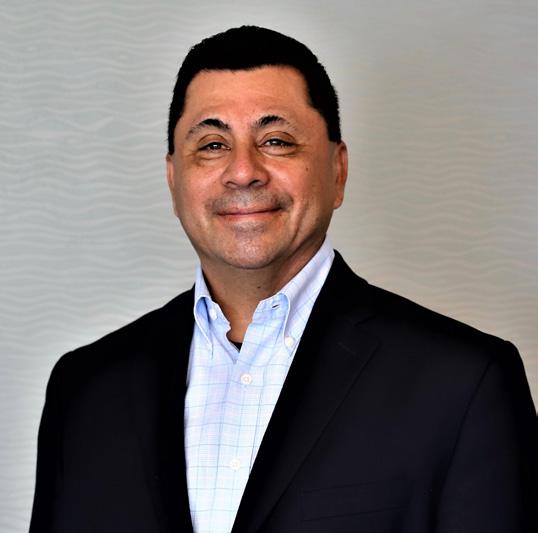
JULIO ESCOBAR
Network
Un mensaje festivo del fundador de Excell Network
Al acercarme a mis 25 años de servicio en el ministerio de justicia restaurativa, lo hago con la firme convicción de que mis principios fundacionales son tan válidos hoy como lo fueron en 1995: visión, evaluación y AMOR en lo que hago con la ayuda de Dios y por Dios. Este año, en octubre de 2020, presentamos Excell Network
En nuestra misión en Excell Network, creemos que todos pueden sobresalir en lo que hacen cuando quieren un cambio. Restauramos la dignidad de las personas que regresan a casa desde la prisión al proporcionar becas para ayudar a los estudiantes a lograr las metas académicas y profesionales que desean obtener. Nuestro enfoque es el mismo que el Padre amoroso tuvo para su hijo pródigo que regresó a casa: restauró su dignidad.
Lo invitamos a ser parte de nuestros esfuerzos
donando, comprando un regalo navideño en nuestra tienda en línea, y / o como voluntario. Lo invitamos a conocer más sobre nosotros visitando excellnetwork.org.
Las vacaciones son un momento para agradecer y reflexionar sobre todo lo que hemos logrado juntos en el último año y esperar un nuevo año de propósito inspirado. Verdaderamente ahora es la época más maravillosa del año, un momento para que nosotros también nos reunamos de una manera segura para celebrar y disfrutar el sentido de familia y comunidad que compartimos. Agradecemos a nuestros donadores quienes creen en nosotros.
En nombre de todos nosotros en Excell Network, les enviamos nuestros mejores deseos para usted y los suyos por una maravillosa temporada navideña y un año nuevo bendecido, próspero, pacífico y saludable.
JULIO ESCOBAR
Founder Excell
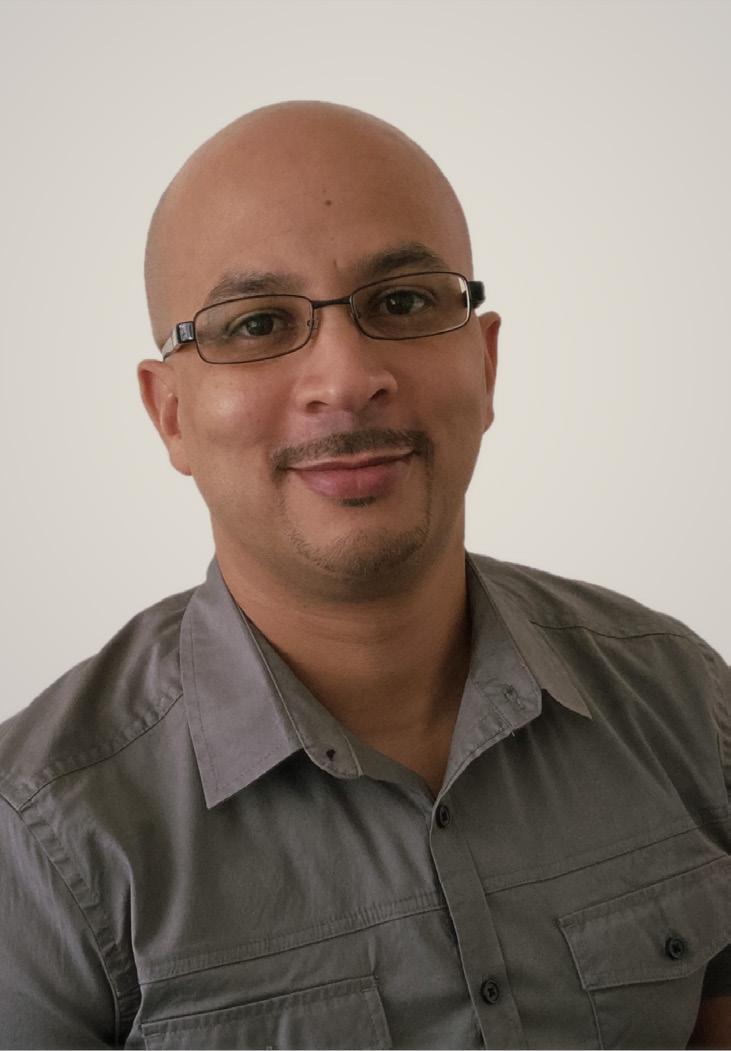
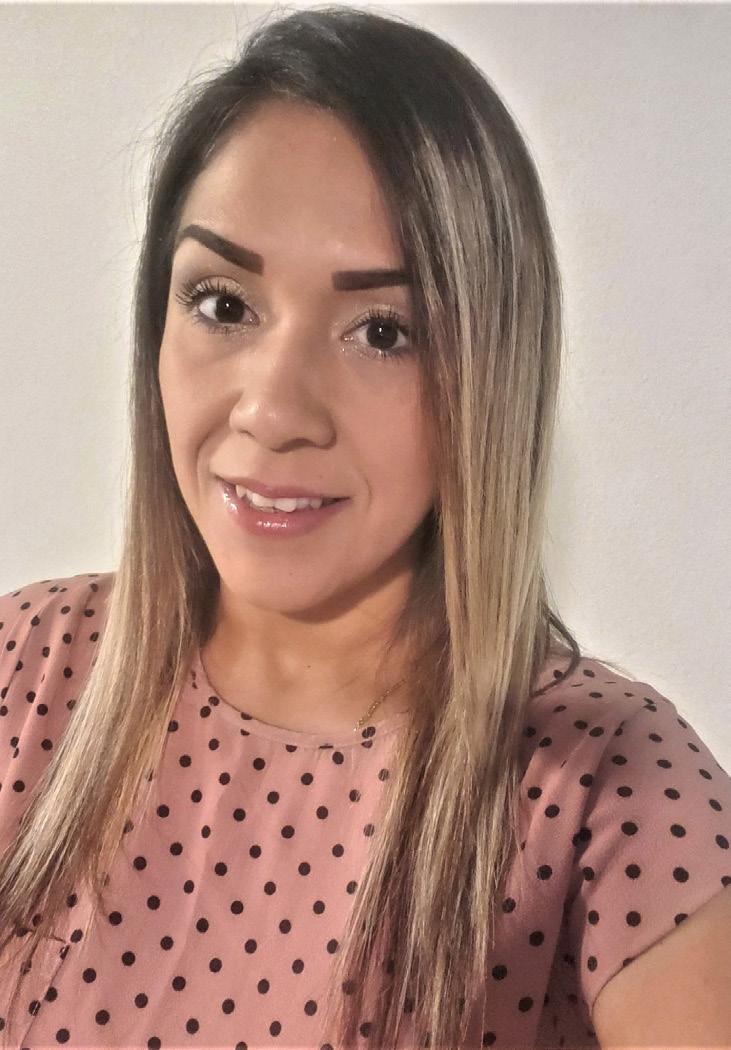
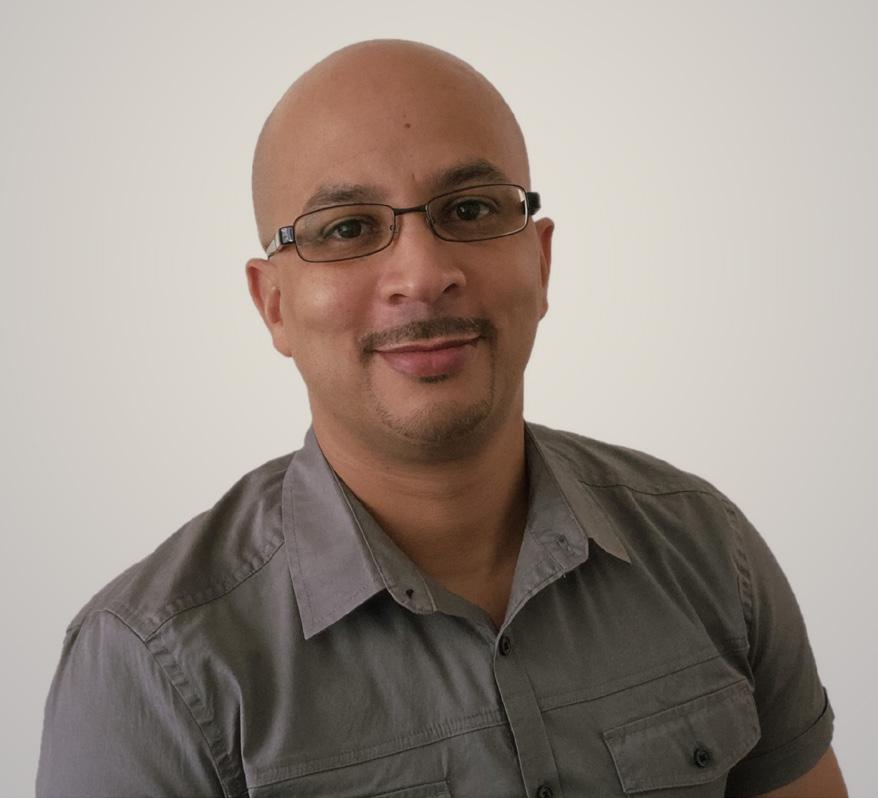
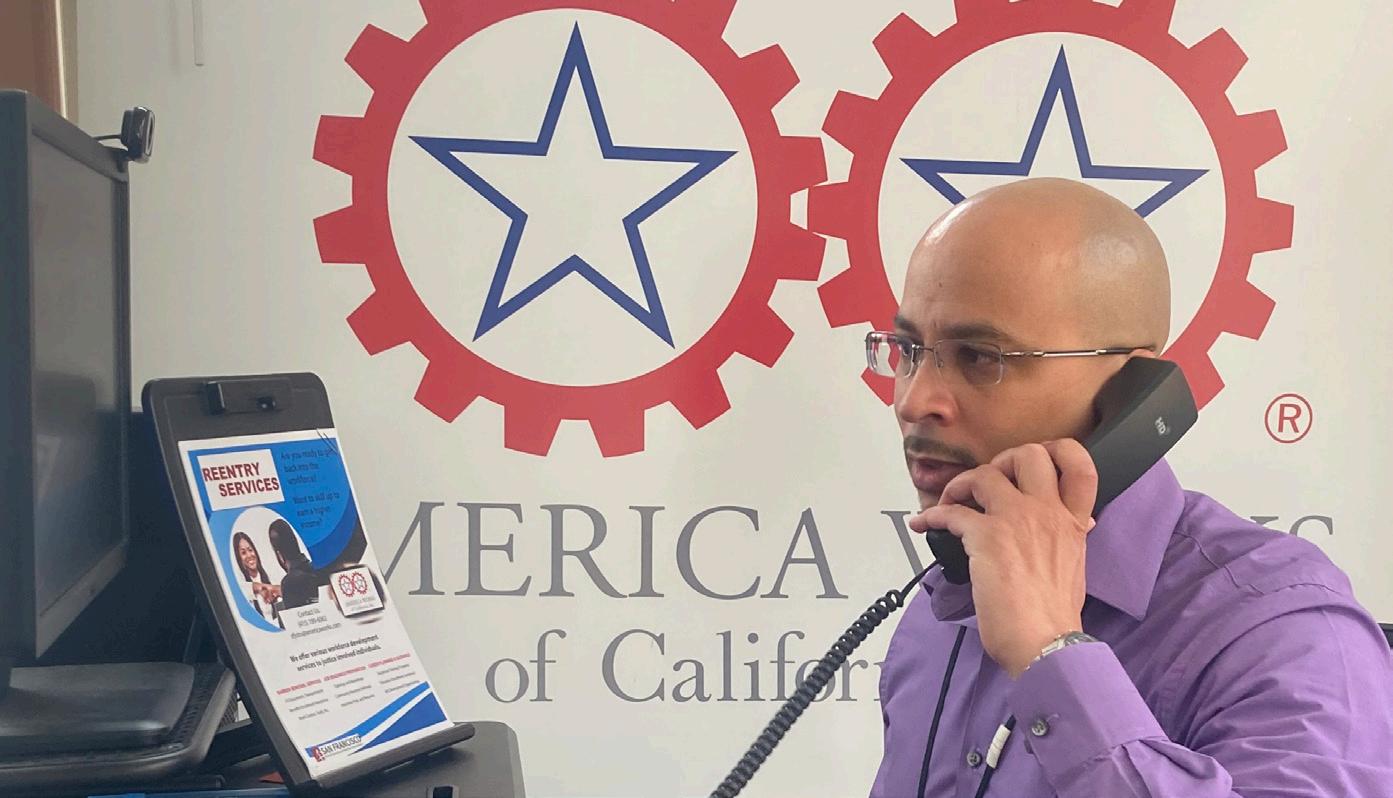
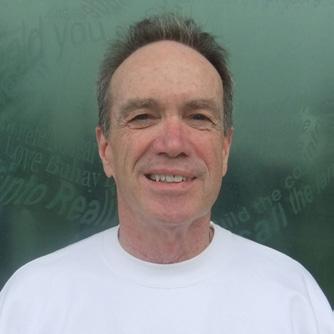
Bobby Jones-Hanley was sitting in Placer County jail when he made a bargain with God.
Facing multiple charges -- the most serious being counterfeiting -- from both local and federal prosecutors, things didn’t look good for the 35-year-old. With two stretches in prison already behind him, he faced the very real possibility of not being a free man again for at least 13 to 15 years.
“I hadn’t prayed for over 21 years, but decided to try,” says Jones-Hanley, “With all of the things I had been through throughout my life, I felt that if God ever wanted a chance to show me He existed that was the time to do it.”
Even though it looked fairly hopeless, he prayed for a single-digit sentence. He asked his ex to pray, too. If his prayer was answered, he vowed to spend the remainder of his life seeking God and helping others.
When he entered the lawyers consulting room before court to learn his fate, he was astounded at what his lawyer told him. The Placer County District Attorney’s Office had decided to drop its case against him. He would only have to answer to the one federal charge. His lawyer was as surprised as he was.
“From that point forward,” says Jones-Hanley, “I started seeking God.”
As the mixed-race son of a black father and a white mother growing up in a dysfunctional family in the
Bobby Jones-Hanley se encontraba sentado en una cárcel del condado de Placer cuando hizo un trato con Dios.
Fue acusado de múltiples cargos - siendo el más serio de estos la falsificación de documentos-, por autoridades locales y federales, las cosas no se veían bien para el hombre de 35 años. Habiendo estado ya dos veces en prisión, se enfrentaba a la muy real posibilidad de no poder volver a ser un hombre libre por al menos de 13 años a 15 años.
“No había orado en más de 21 años, pero decidí intentarlo” dijo Jones-Hanley, “Con todas las cosas por las que he pasado en mi vida, sentí que, si Dios quería una oportunidad para mostrarme que Él existe, ese era el momento para hacerlo”
Aunque las cosas se miraban sin esperanza, el rezaba por una sentencia de corta. También le pidió a su ex-esposa que orara por él. Si sus oraciones eran escuchadas, juro dedicar el resto de su vida a buscar a Dios y a ayudar a otros.
Al entrar a la oficina de los abogados antes del juicio, se quedó sin palabras al escuchar lo que le dijo su abogado. La oficina del fiscal del distrito del condado de Placer había decidido abandonar el caso. Solo tendría que afrontar el cargo federal. Su abogado estaba tan sorprendido como él.
“Desde ese momento,” dijo Jones-Hanley, “empecé a buscar a Dios”
Sacramento area, Jones-Hanley had spent much of his life seeking to survive and to find his place in the world. At the age of two, his parents had divorced. And shortly after his mother’s third marriage, he began having numerous clashes with his second step-father. Then, one afternoon his step-father delivered an ultimatum to his mother: Either the boy went or he would. At first his mother held her ground, responding that her son hadn’t done anything wrong. His step-father then left for two months, and when he returned on Christmas Eve with divorce papers in hand, it was too much for his mother to bear. She asked her son to leave.
After being kicked out of the house numerous times since the age of 14, that Christmas Eve, at the age of 15, would be the last time he lived at home with his mother and younger brother. Full of anger and resentment, and out of desperation to survive, he started shoplifting. He started smoking marijuana to cope with his emotional pain, and began selling it to earn money. His brushes with the law steadily increased. Although he managed to continue attending school, receive good grades, and even got a partial scholarship to a private university in Idaho, he struggled financially. He began selling and smoking marijuana again to deal with his stress and supplement his income -- a practice that continued after he dropped out of school and returned to the Sacramento area.
After serving a year in county jail for a DUI conviction, he landed a job with a local fiber optic engineering firm.
“I started doing really well,” says Jones-Hanley. “I was really moving forward in my career.”
When an opportunity to work for an international fiber optic firm in Oregon came up, he began working out of state with the blessing of his probation officer. Later, when he was assigned a new probation officer, he was told that he had to quit his job in Oregon, or they would violate him and give him his 5-year suspended sentence.
Once again, Bobby found himself struggling financially. “I quickly began to run out of money and was on the verge of losing my car and apartment,” says Jones-Hanley. “Then I ran into an old friend at a gas station. We started dressing up as cops and robbing drug dealers.”
A bungled robbery attempt resulted in a six-year stint in state prison.
Siendo un hijo de raza mixta, descendiente de un padre negro y una madre blanca creciendo en una familia disfuncional en el área de Sacramento, Jones-Hanley dedicó gran parte de su vida a intentar sobrevivir y a buscar su lugar en el mundo. Cuando tenía dos años, sus padres se divorciaron. Y poco después del tercer matrimonio de su madre, empezó a tener múltiples problemas con su segundo padrastro. Luego, en una tarde su padrastro le dio un ultimátum a su madre: o se iba el niño o se iba a ir él. Al principio su madre se mantuvo firme al responder que su hijo no había hecho nada malo. Su padrastro se fue por dos meses y regresó en víspera de navidad con los papeles de divorcio. Eso fue más de lo que su madre pudo soportar. Le pidió a su hijo que se fuera
Luego de ser echado de su casa en varias ocasiones desde que tenía 14 años, esa víspera de navidad, a la edad de 15, sería la última vez que viviría bajo el mismo techo con su madre y su hermano menor. Lleno de enojo y resentimiento, y de desesperación por sobrevivir, empezó a robar tiendas. Empezó a fumar marihuana para lidiar con su dolor emocional, y a venderla para ganar dinero. Sus encuentros con la ley estaban aumentando. Aunque logro mantenerse en la escuela, recibir buenas calificaciones, e incluso conseguir una beca parcial a una universidad privada en Idaho, siempre tuvo problemas económicos. Volvió a vender y fumar marihuana para lidiar con su estrés y suplementar sus ingresos, algo que continúo haciendo luego de abandonar sus estudios y regresar al área de sacramento.
Luego de completar un año en la cárcel por una condena por manejar bajo la influencia del alcohol (DUI), consiguió un trabajo con una empresa local de ingeniería de fibra óptica.
“Me empezó a ir bastante bien,” dijo Jones-Hanley. “Estaba avanzando bastante en mi carrera.”
Cuando se le presentó la oportunidad de trabajar para una empresa de fibra óptica en Oregón, empezó a trabajar fuera de su estado con la aprobación de su agente de libertad condicional. Luego, al ser asignado un nuevo agente, le dijeron que debía que renunciar a su trabajo en Oregón, o iba a tener que continuar su sentencia suspendida de 5 años.
De nuevo, Bobby se encontró con problemas financieros. “Me estaba quedando sin dinero y estaba al borde de perder mi auto y mi apartamento,” dijo Jones-Hanley “Luego me encontré con un viejo amigo en una gasolinera. Solíamos vestirnos como policías para robarle a traficantes de drogas.”
Eventually, says Jones-Hanley, he became so frustrated with the systemic injustices he both saw and experienced that he decided to leave the country. Already adept at forging identification documents, he started a counterfeiting operation in Orange County to finance a move to Spain. The idea was to counterfeit a million dollars and sell it to a gang in Mexico. It was, he says, a desperate and dangerous plan that could have cost him his life.
Arrested before the exchange could be made, he wound up in a Placer County jail cell making a bargain with God.
“Through a series of profound spiritual experiences I came to know with absolute certainty that God exists! And I know for a fact that He had saved my life,” he says.
Six years later, Jones-Hanley walked out of federal prison with $78 in his pocket and a determination to keep his promise to God.
While so-called “jailhouse conversions” are said to be easily made -- and just as easily forgotten -- Jones-Hanley has kept his promise. Since being released from custody in July 2019, he has become involved with a number of nonprofit organizations devoted to helping those most in need. Immediately after his release and while still living in a halfway house in Oakland, he began working for Hospitality House, which serves the homeless. Currently, he’s in a fellowship program at Uptima, which he describes as an entrepreneurial boot-camp. And he now works for America Works of California, specializing in helping justice-involved individuals find and sustain employment.
Un intento de robo fallido resultó en una sentencia de seis años en una prisión estatal.
Eventualmente, dijo Jones-Hanley, le frustraron tanto las injusticias sistémicas que vio y experimento, que decidido irse del país. Teniendo ya experiencia en la creación de documentos de identidad falsos, empezó una operación de contrabando en el condado de Orange para financiar su viaje a España. La idea era falsificar un millón de dólares y vendérselos a una pandilla en México. Fue, dice Jones, un plan desesperado y peligroso que le pudo haber costado la vida.
Al ser arrestado antes de poder completar el intercambio, terminó en una celda de una cárcel del condado de Placer, haciendo un trato con Dios.

“Luego de una serie de experiencias espirituales profundas, ¡Vine a darme cuenta con certeza absoluta que Dios existe! y estoy seguro que Él salvó mi vida” dice él.
Seis años después, Jones-Hanley saldría de una prisión federal con $78 en su bolsillo y una determinación por mantenerle su promesa a Dios.
Jones-Hanley, who now lives in San Francisco, also has plans to start his own non-profit -- Pure 1, whose goal is to help re-entry and homeless
Aunque se dice que las llamadas “conversiones de cárcel” se hacen fácilmente, también son olvidadas con la misma facilidad, Jones-Hanley ha mantenido su promesa. Desde salir de custodia en Julio de 2019, se ha involucrado con varias organizaciones sin fines de lucro dedicadas a ayudarle a los que más lo necesitan. Inmediatamente después de su sentencia y aun viviendo en un hogar de transición en Oakland, empezó a trabajar para Hospitality House, quienes le ayudan a las personas sin hogar. Actualmente, está en un programa de especialización en Uptima, el cual él describe como un campamento de emprendimiento. Y ahora trabaja para
individuals gain financial stability through fast-track career development programs, with support and collaboration from key service providers. The vision statement on it’s website, pure1.org, states that its purpose is “Coming together in God’s Name to rebuild lives and create a more just and equitable world.”
“It’s to help others break the cycles of incarceration, homelessness and poverty,” he says. “I’ve suffered all of these things since I was 14. The experiences I’ve been through have increased my compassion, and they’ve fueled my passion to help others overcome these social issues.”
Shortly after arriving at the halfway house in April 2019, Jones-Hanley met Julio Escobar, the director of Communidad San Dimas Inc., at the Restorative Justice Re-entry Conference and Resource Fair. Sponsored by the Archdiocese of San Francisco, the annual event brings together local non-profit service providers that serve the formerly incarcerated and crime victims.
America Works of California, especializando en ayudar personar involucrados en el sistema de justicia a encontrar y mantener empleo.
Jones-Hanley, quien ahora vive en San Francisco, también tiene planes para crear su propia organización sin fines de lucro, Pure 1, cuya meta es ayudarle a individuos en reinserción social e individuos sin hogar ganar estabilidad financiera a través de programas de desarrollo de carreras de vía rápida, con apoyo y colaboración de proveedores de servicios clave. La visión de la organización está en su sitio web pure1.org, indica que su propósito es “Unirnos en el nombre de Dios para reconstruir vidas y crear un mundo más justo y equitativo”
“Es para ayudarle a otros romper los ciclos de encarcelamiento, desamparo y pobreza” dice Jones “He sufrido todo eso desde que tenía 14. Las experiencias que he pasado han aumentado mi compasión, y han alimentado mi pasión para ayudarle a otros a superar estos problemas sociales.

Escobar says he liked what he saw in the recently released Jones-Hanley, who was working at Hospitality House at the time.
“He impressed me because of the concern he had, the passion that he showed, for people coming out of jail,” says Escobar. “And I saw that he was eager in wanting to change. I see nothing but a bright future for him.”
Escobar was so impressed that he offered to accept Jones-Hanley in Communidad San Dimas’ new Excell Network program, which gives formerly incarcerated adults financial and spiritual support to help them meet their educational goals.
Currently taking classes at City College of San Francisco, Jones-Hanley plans to transfer to either UC Berkeley or San Francisco State University and study business administration.
“I always wanted to start my own business,” says Jones-Hanley. “Now, the focus is more on the nonprofit sector because I want to give back to the community.”
Poco después de llegar al hogar de transición en abril de 2019, Jones-Hanley conoció a Julio Escobar, el director Communidad San Dimas Inc., En la Conferencia y Feria de Recursos de Reinserción de Justicia Restauradora. Patrocinado por la Arquidiócesis de San Francisco, el evento anual une a los proveedores de servicios sin fines de lucro que ayudan a los previamente encarcelados y a víctimas de delincuencia.
Escobar dice que le agradó lo que vio en el recientemente liberado Jones-Hanley, quien trabajaba en Hospitality House en ese momento.
“Me impresiono por la preocupación que tenía, la pasión que mostraba, por las personas que van saliendo de la cárcel,” dijo Escobar. “Y vi que estaba ansioso por querer cambiar. Solo veo cosas buenas para su futuro.”
Escobar estaba tan impresionado que ofreció aceptar a Jones-Hanley en el nuevo programa Excell Network de Communidad San Dimas, el cual le da a adultos previamente encarcelados soporte financiero y espiritual para ayudarles a cumplir sus metas educacionales.
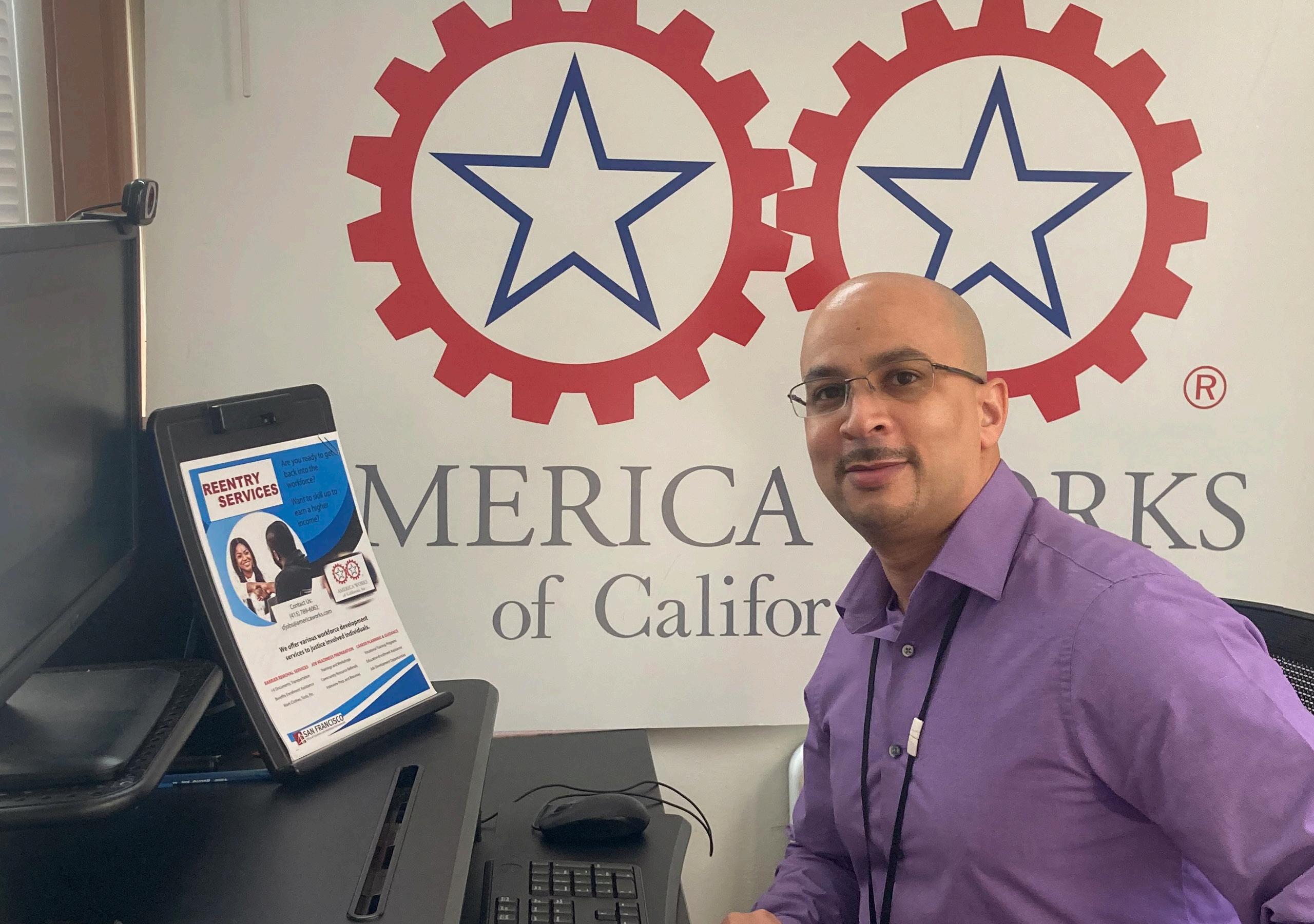
Jones-Hanley se encuentra actualmente tomando clases en el City College de San Francisco y tiene planes para transferirse a UC Berkeley o a San Francisco State University y estudiar administración de empresas.
“Siempre quise comenzar mi propio negocio”, dice Jones-Hanley. “Ahora, el enfoque se encuentra más en el área sin fines de lucro porque quiero ser recíproco con la comunidad”.

“IT’S A GOOD FEELING COMING AFTER ALL THOSE YEARS OF MESSING UP”
Sitting at a picnic table on a sunny day at San Bruno’s Commodore Park, Lilliana Gonzalez talks about how well things have been going since she was released from prison a year-and-a-half ago.
Since starting work at San Francisco’s Hospitality House in March, she has been promoted from peer advocate to case manager -- a job she looks forward to when she gets up each morning.
A few weeks ago, she and her boyfriend moved out of the Tenderloin into an apartment a few blocks from here.
She has been reunited with her eight-year-old son, Dominic, who amuses himself in the nearby play area for children while his mother talks.
She recently received an “A” in her first class at City College of San Francisco.
She continues to stay clean from the drugs that once blighted her life.
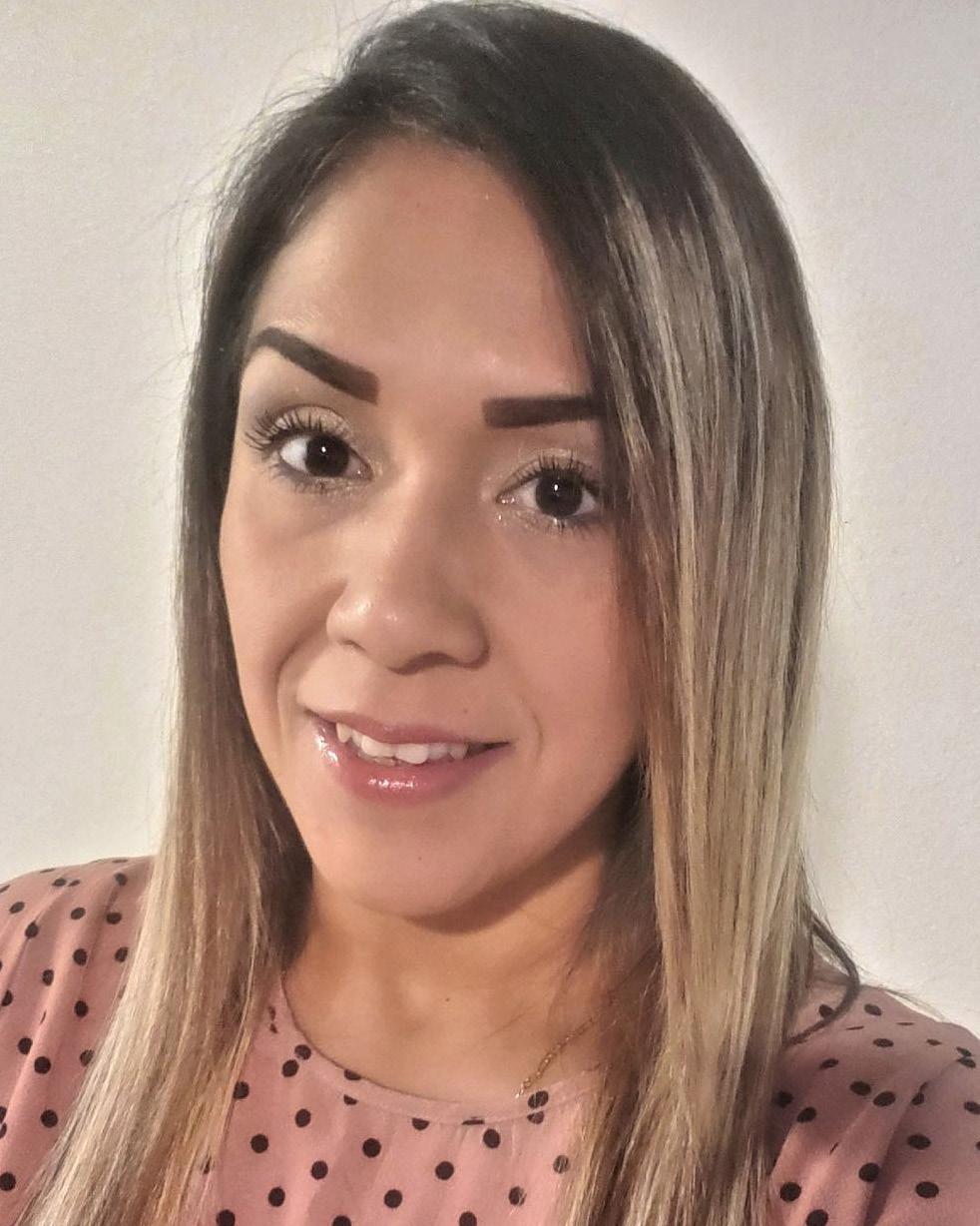 By Dana Perrigan
By Dana Perrigan

Sentada en una mesa de picnic en un día soleado en el parque Commodore de San Bruno, Lilliana González habla de lo bien que le va desde que salió de prisión hace un año y medio.
Desde que empezó su trabajo en la Hospitality House de San Francisco, ha sido promovida de asesora a administradora de casos, un trabajo el cual mira con emoción cada mañana que se levanta.
Hace un par de semanas, ella y su novio se mudaron fuera de Tenderloin a un apartamento a un par de bloques de aquí.
Ella se reunió con su hijo de ocho años, Dominic, el cual se divierte en el área de juegos para niños mientras su madre habla.
Recientemente recibió una “A” en su primera clase en el City College de San Francisco.
Continúa manteniéndose limpia y lejos de las drogas que en su momento frustraron su vida.
“It’s a good feeling coming after all those years of messing up,” she says. “ I’m continuing to do really good. I believe I deserve a good life -- and my children, too.”
An attractive woman who looks much younger than her 38 years, Gonzalez was little more than a child herself when she started down a path that eventually led to federal prison.
Growing up in Fresno in a home that she describes as “a little dysfunctional,” Gonzalez started drinking when she was 13. At the age of 17, she was pregnant with her first child.
“Then the drugs came in,” she says. “I got introduced to meth. I started using heavily. I started hanging out with the wrong people, the wrong crowd.”
Soon she was involved in commercial burglaries and was frequently in and out of jail.
Things continued to go downhill as the years passed. She met someone who introduced her to various forms of fraud -- identity theft, mail and credit card fraud.
Two years later, she was arrested.
“I got really scared,” she says. “All those other times I was in and out of jail I wasn’t scared like I was when the feds picked us up.”
Her fears were justified. She learned she could be locked up in a federal prison for 30 years if found guilty of the charges against her.
“When I heard that, I was terrified,” she says. “I thought that was what was going to happen.”
It took about a year before her case came to trial. During that time, Gonzalez left jail and entered a 90-day rehab program. After completing the program, she stayed clean and worked while awaiting her fate in court.
“I just told myself that I wanted to do good,” she says. “I had enough.”
Gonzalez continued to do good after being sentenced to three years in prison. She took computer classes. She completed the Ardap Progam -- an intensive, nine-month substance abuse rehabilitation program administered by the U.S. Federal
“Es una buena sensación luego de todos esos años de equivocarme,” dice Liliana. “Continúo estando bastante bien. Pienso que merezco una buena vida, y mis hijos también”; agregó.
Una mujer atractiva que se mira mucho más joven de lo que sus 38 años aparentan, González acababa de dejar de ser una niña cuando inició un camino que eventualmente la llevaría a una prisión federal.
Creciendo en Fresno, en un hogar el cual ella describe como “un poco disfuncional” González empezó a beber cuando tenía 13 años. A la edad de 17, estaba embarazada con su primer hijo.
“Luego vinieron las drogas” dice Lilliana. Probé la metanfetamina. La empecé a consumir bastante. Empecé a juntarme con la gente equivocada, con malas compañías”
De pronto, se involucró en hurtos comerciales y se encontraba con frecuencia en la cárcel.
Las cosas siguieron yendo cuesta abajo a medida que pasaban los años. Conoció a alguien quien la introdujo a varias formas de fraude - robo de identidad, y fraude de correo y tarjetas de crédito.
Dos años después, fue arrestada.
“Me asusté mucho”, dice Lilliana “En todas las otras ocasiones que entraba y salía de la cárcel, nunca estuve asustada de la manera que estaba cuando nos descubrieron los federales.
Sus temores estaban justificados. Se enteró que podría pasar 30 años en una prisión federal si la declaraban culpable de los cargos acusados.
“Cuando escuché eso, me aterroricé”, dice Lilliana. “Pensé que eso era lo que iba a pasar”.
Pasó aproximadamente un año antes de que su caso llegara a juicio. Durante ese tiempo, González salió de la cárcel y entró en un programa de rehabilitación de 90 días. Después de completar el programa, se mantuvo libre de drogas y trabajó mientras esperaba su destino en la corte.
“Solo me decía a mí misma que quería hacer las cosas bien,” dice Lilliana “Fue lo suficiente.”
González continúo haciendo las cosas bien luego de ser sentenciada a tres años en prisión. Tomo clases de computadora. Completó el programa Ardap,
Bureau of Prisons. She started working out and taking care of herself, losing 50 pounds in the process.
After being released from prison in April 2019, Gonzalez took up residence in a halfway house in San Francisco. She enrolled in a re-entry program, which she said helped her learn more about herself.
Prior to the shut-down due to the Coronavirus pandemic she worked two jobs -- at a vegan restaurant and at a Goodwill store. When those jobs ended, she started working at Hospitality House in the Tenderloin.
As a case manager in the employment unit, Gonzalez serves those who are experiencing homelessness -- including veterans and the formerly incarcerated -- find work. She helps them create resumes, cover letters, fill out applications, etc. Her own experience and struggles, she said, make it easier for her to understand and aid her clients.
“I love it,” says Gonzalez. “I love my job. It’s helping people -- helping them find jobs and other resources they need.”
Gonzalez’s future plans include buying a home for her family, strengthening her relationships with her children, and furthering her education. Having completed her first course at City College of San Francisco, and encouraged by having done so well in it, she looks forward to the challenges of the next semester.
Through a friend, she learned about Comunidad San Dimas’ new Excell Network Program, which offers financial and spiritual support to formerly incarcerated adults pursuing an education.
After speaking with Julio Escobar, the director of Comunidad San Dimas, Gonzalez applied and was accepted into the program.
“She is very enthusiastic about getting involved and going to school,” says Escobar. “I think she will do very well.”
Gonzalez is planning on it.
“I would like to get my A.A. (Associate of Arts) degree,” says Gonzalez, “and become a social worker.” Through working at Hospitality House, I’ve learned that I really like helping people.”
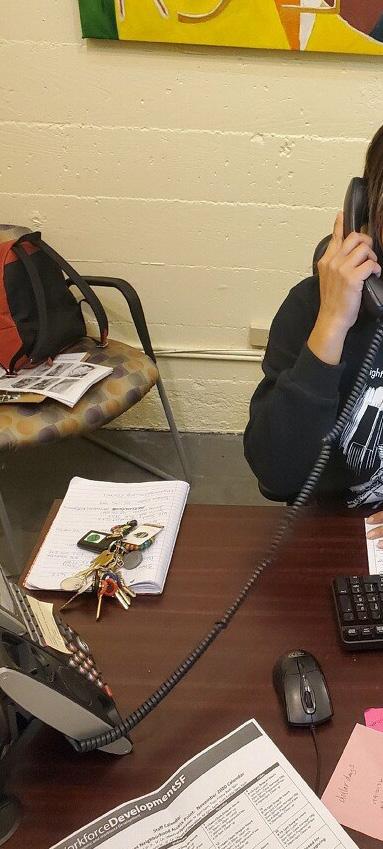
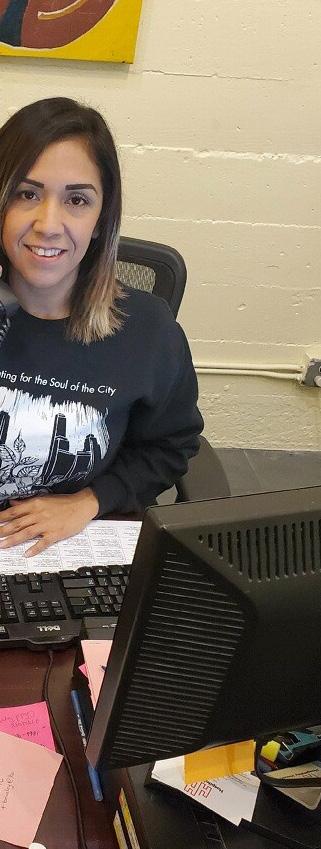
un programa intensivo de nueve meses de rehabilitación de abuso de sustancias administrado por la Oficina Federal de Prisiones de Los Estados Unidos de América. Comenzó a hacer ejercicio y a cuidar de sí misma, perdiendo 50 libras en el proceso.
Después de salir de prisión en abril de 2019, González vivió en un hogar de transición en San Francisco. Se inscribió en un programa de reinserción, el cual dijo que la ayudó a aprender más sobre sí misma.
Tenía dos empleos antes del cierre causado por la pandemia de Coronavirus, en un restaurante vegano y en una tienda Goodwill. Cuando llego el fin de esos trabajos, comenzó a trabajar en Hospitality House en Tenderloin.
Como administradora de casos en la unidad de empleos, González ayuda a los que carecen de vivienda, incluyendo a veteranos y a los que han estado previamente encarcelados, a encontrar trabajo. Les ayuda a crear sus currículos, cartas de presentación, llenar solicitudes, etc. Su propia experiencia y problemas, dijo Lilliana, le facilitan a entender y a ayudar a sus clientes.
“Me encanta” dice González “Me encanta mi trabajo. Es ayudar a las personas, ayudarles a encontrar empleo y otros recursos que necesitan.”
Entre los planes para el futuro de González, está comprar una casa para su familia, reforzar sus relaciones con sus hijos, y avanzar en su educación. Habiendo completado su primer curso en el City College de San Francisco, y animada por su desempeño en él, espera con ansias los retos que puede traer el siguiente semestre.
Por un amigo, ella escucho del nuevo programa Excell Network de Comunidad San Dimas, el cual ofrece apoyo financiero y espiritual a adultos previamente encarcelados que buscan una educación,
Luego de hablar con Julio Escobar, el director de Comunidad San Dimas, González aplicó y fue aceptada al programa.
“Está muy entusiasmada por involucrarse y por regresar a la escuela”, dice Escobar. “Pienso que le va a ir muy bien”
González está trabajando en eso.
“Me gustaría conseguir mi diploma de A.A. (Asociado de Artes) y convertirme en una trabajadora social” dice González. “Trabajando en Hospitality House, he aprendido que en realidad me gusta ayudar a las personas”.

